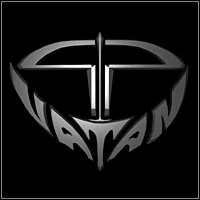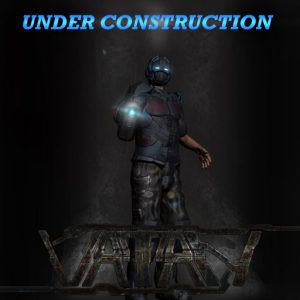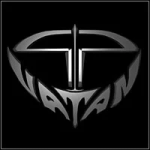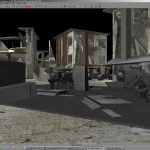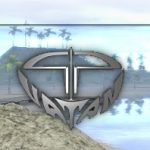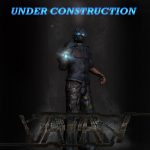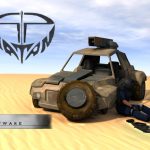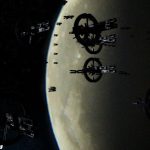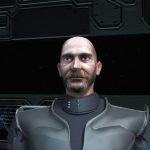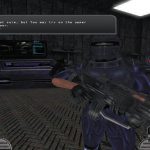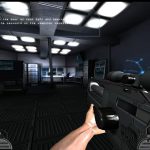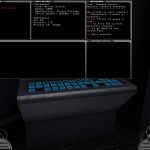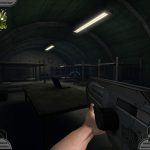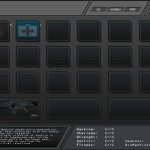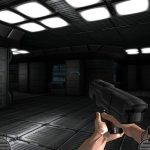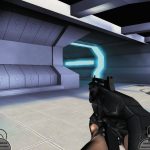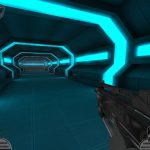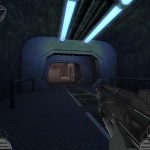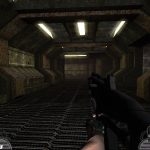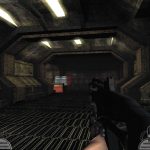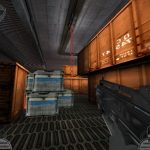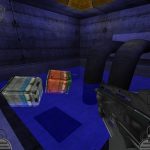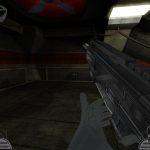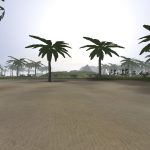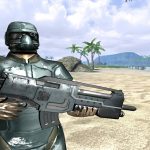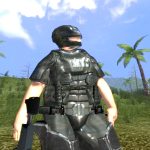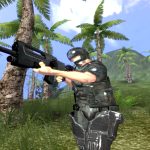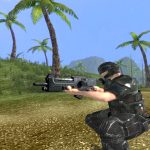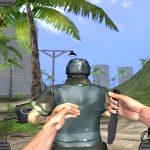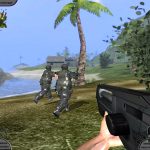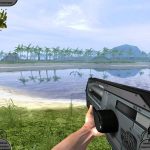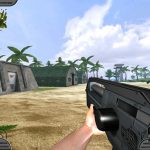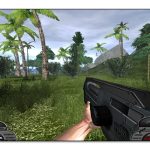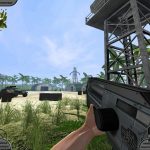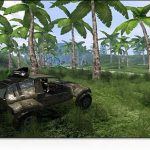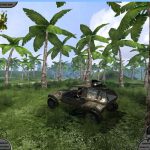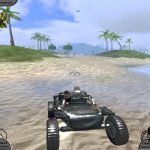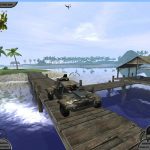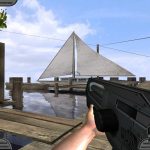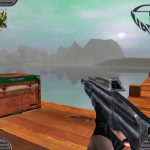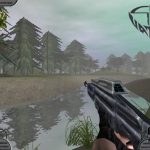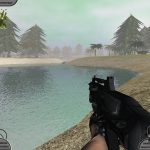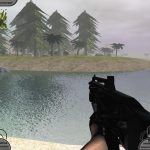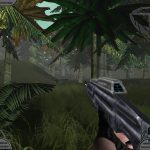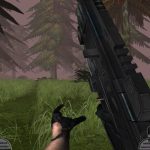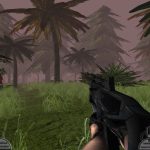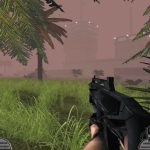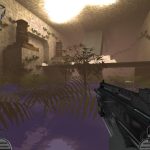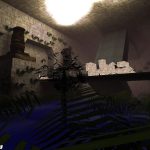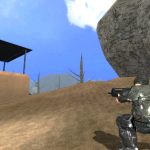Vatan is a cancelled futuristic First-Person Shooter/Role-Playing Game developed by Portuguese studio Fy Software from 2003 to 2005, exclusively for PC. Inspired by titles such as System Shock and Deus Ex, the game was set in the 23rd century after humanity colonized numerous parts of the galaxy. The player took the role of a Republic legionnaire brought to fight a rebel faction seeking independence.
Revealed in October 2004, we learned more about its features and background in December of the same year thanks to an interview led by Warcry:
“A couple hundred years from now, in this part of the galaxy…” Okay, so it’s not Star Wars. But it does have a Republic, and rebels, and a massive galactic conflict between the forces of tyranny and the champions of freedom. And personally, I’ve always been down with blowing up stuff in space.
“In the dark future of 2234,” Bruno Cesteiro, of FY Software, intones in his most Lorne Greene-esque voice, “the known universe is split into two factions. On one side, there’s the Republic, a powerful economic group that wants to subjugate all the known colonies. On the other side, there’s a small group of people that we call the Rebels, that fight for freedom from the claws of the Republic.”
While it may not be the most creative backdrop for a game we’ve ever seen, it does offer an intriguing premise that promises both a strong FPS and RPG experience. Certainly not an easy task, as Cesteiro confirms. “We want to get both game types in the game,” he said, “but that’s a very hard thing to do. I’ll have to say that primarily the game is an FPS. However, the player does evolve, and does have the ability to evolve in a direction, either as a strong fighter, a computer expert, etc.” While creating a game that operates on a level comparable to System Shock or Deus Ex is bound to be difficult in myriad ways.
Technologically, Vatan will be middle of the pack. “We’re not trying to compete with million-dollar budget titles,” Cesteiro says. “Doom 3 technology using stencil shadows, per-pixel lighting, etc., won’t be in Vatan. That kind of technology doesn’t work in outdoor environments.” And while it may not be the cutting edge graphically, Vatan isn’t pulling any punches with its physics engine. “We are putting a great effort into physics. Physics in Vatan are real physics,” he went on, “with real friction and mass, and not fakes like many games do.”
The game experience is the real focus of Vatan, and it makes some pretty big promises. “The player has the ability to choose which direction his character will go,” Cesteiro says as he describes the gameplay to us. “His choices will affect the gameplay and how he completes his missions. If you are a good fighter, you can go into a room full of soldiers, kill all of them and get access to a certain location. If you are a computer expert, maybe it’s wise to avoid those folks, hack into a terminal, and open a door from there.”
FY Software is hoping to have Vatan ready to release in the first quarter of 2005, but nothing–including the publisher–is carved in stone at this point.
During the following months, communication around Vatan was essentially based on the publication of screenshots. In September 2005, Bruno Cesteiro was interviewed by Planet 3D Games:
P3G: As the project is unknown to many of our readers, could you please present your work in brief words?
B.C.: (…)The game is divided into several missions, and each mission has it’s own type, the player can be in a mission in where he doesn’t need to take a single shot, or he can be in a mission with lots of action.
P3G: Thanks for this introduction. As we know the game takes place in a futuristic 23rd century environment. Can you give us further information about the game world?
B.C.: The game world, as you know is in a distant future. Many worlds are being colonized by either the Union or by the Rebel faction.
Usually worlds that have Rebel presence are poor and under developed, structures and other facilities are constructed with raw materials that are at hand, so, there’s a mix of really old-tech with high-tech in the constructions.
Usually worlds that have a Union presence look more advanced, but it depends on the proximity of central planets.
P3G: Will the game world be level based or world based where the player has the possibility to explore a big world without have to follow a certain path?
B.C.: The game world is level based, however everything that is picked up, skills gained, etc, are transported from level to level.
P3G: What locations await the player? Can you give our readers some examples?
B.C.: We try to create a rich mix of different environments so that the player doesn’t get bored and always wanders through the same types of landscapes. Currently the game includes various tropical locations, desert regions, swamps and two different city types.
P3G: Let’s talk about the protagonist: The player will assume the role of a legionnaire who serves in a special infantry unit. How important has story design been in your development process so far, and can you tell us a bit more about the core plot? What will be the player’s primary goal and how did you come up with this idea?
B.C.: The whole plot was worked out before we actually started developing the game. All the levels have been built around this story, so it has to be said that it has played a very important role in our development work so far. The player’s task is relatively easy to describe at the beginning of the game: complete the mission that your superiors have given you. But that will change as the game progresses.
P3G: What kinds of tasks will there be to solve?
B.C.: There are basically two different types of missions: First, we have the FPS missions, where there will be a lot of action and the game will play like a shooter. The second mission type are the so-called RPG missions, in which the player is given the task of exploring an undiscovered area or solving various problems.
P3G: Can you tell us something about the actual gameplay? What things will the player be able to do in the world?
B.C.: There is a wide spectrum of challenges for the player: e.g. it will happen that he will be assigned to a whole platoon, so he is not always alone. He will be able to decide whether he prefers a frontal attack on the enemy troops, or prefers to proceed slowly and undetected. The latter option in particular offers some nice gimmicks: For example, it will be possible to throw picked up stones into a room to distract individual enemy forces in order to distract them and slowly sneak around them.
You will also be able to use vehicles or hack into computers to open bridges, for example. Many objects found throughout the game can be taken away. What is special about our object system is that each object is assigned its own physical properties. For example, it is possible to pick up a cartridge magazine, take it with you, drop it again, e.g. throw it into the water or if it is on the ground, kick it.
P3G: Apart from the inventory, what specific RPG elements will be included in the finished game and will they affect the gameplay?
B.C.: There will be several elements that may change as development progresses. As of this writing, the skills are: Hacking, Charisma, Strength, Agility, Sneak, Vehicles, and Weapons. Each of these skills has an impact on how the player can solve a mission.
For example, he may find a vehicle in a mission but his vehicle skill is not yet high enough to use it. As a result, he cannot use it and must complete the mission on foot. If he finds a weapon extension and the player mounts it on one of his weapons, it is also possible that his weapon skill is still relatively low and the extension is not bringing the maximum possible benefit.
P3G: What types of weapons will the player be able to use?
B.C.: There are different weapon systems that the player can use. Each weapon can also be improved with various upgrades such as a telescope, an improved aiming chip or a grenade launcher. Of course, the same applies here as in the previous example: In order to be able to assemble such objects, a certain skill is required. Speaking of items, it should be mentioned that there are also a large number of other types: e.g. repair kits to repair the weapons, binoculars or various explosives.
Unfortunately, the project vanished after this, as it was clear that its developer didn’t manage to secure a publisher. Vatan was quietly cancelled and Fy Software shutted down not so long after its cancellation.
Bruno Cesteiro, alongside his brother Ricardo, founded in 2009 Camel 101 and are still active in the video game industry to this day. In 2010, while promoting their next game, Gemini Wars, Destructoid spoke to them about their journey. Vatan was briefly mentionned:
The three core team members started out years ago by working on an FPS game, which later evolved into a creating an engine called the ‘Vatan game engine’ from scratch. Together they managed to get the Vatan engine to win a games competition in Portugal back in 2006, and it inspired them to become more serious about game development.
Images:
Video:
What do you think about this unseen game? Give your vote!
Would you like to add more info, screens or videos to this page? Add a comment below!
- F.E.A.R. 2 (Day 1 Studios) [PC / PS3 / Xbox 360 – Cancelled Pitch] - 25-01-2025
- Project 1V1 [PC – Cancelled] - 21-12-2024
- Enemy Front [PC / Playstation 3 / Xbox 360 – Cancelled] - 21-09-2024

